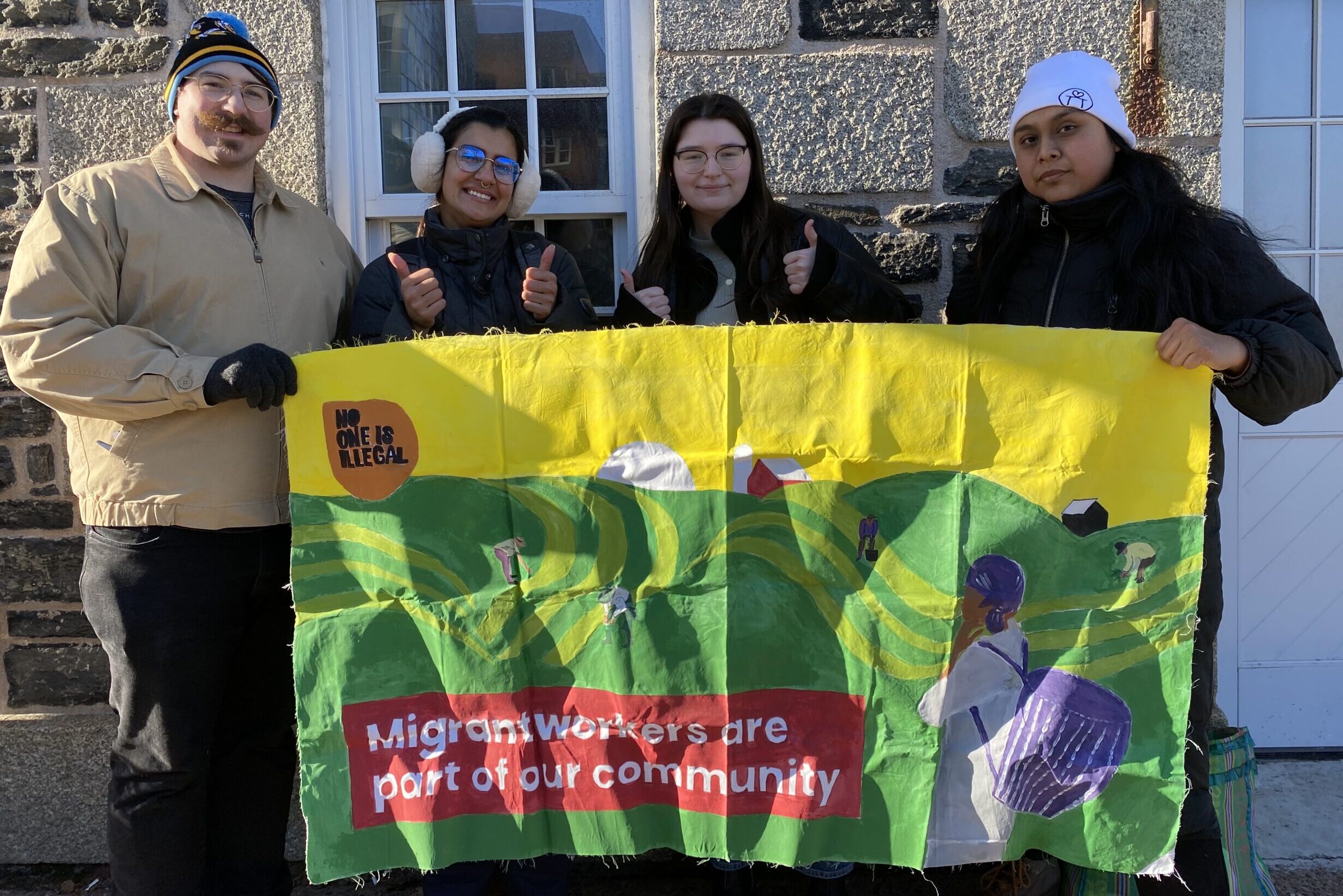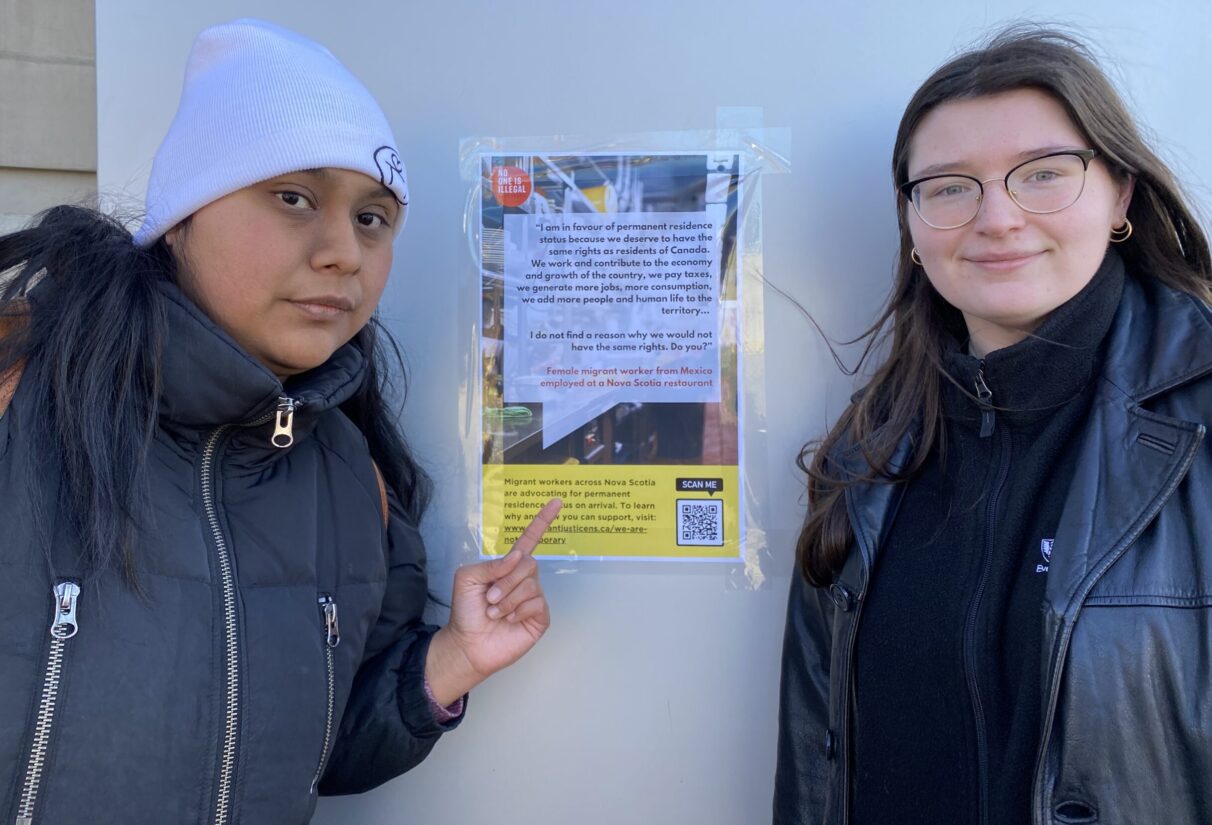N.S. group pushes for permanent status for migrant workers
Labour economist says there are entrenched obstacles for foreign workers

caption
No One is Illegal started a new poster campaign on Nov. 25 to raise awareness about status for migrant workers.When Kerian Burnett, a Jamaican migrant worker, came to Nova Scotia last year to work on a farm, she got sick working in the rain.
“I asked (a co-worker) if they could call the supervisor for me,” said Burnett. The co-worker said it wouldn’t make a difference “because they never come.”
Burnett was later taken to the emergency room and her condition kept getting worse. Throughout the assessment process, she said health-care workers denied her services such as blood tests and PET scans because she couldn’t pay out of pocket and she didn’t have health insurance.
Stacey Gomez, a program manager for the migrant workers program run by No One is Illegal Nova Scotia (NOII-NS) said other migrant workers like Burnett face similar challenges.
“We see, for example, seasonal agricultural workers who have been coming for 10 years to Canada. Only around two per cent are able to become permanent residents,” said Gomez.
NOII-NS launched a new poster campaign on Nov. 25 as the latest part of a nationwide push. The #StatusforAll campaign calls for permanent resident status on arrival for all migrants, including migrant students, refugees, undocumented people, and migrant workers.
According to Statistics Canada, in 2021, 924,850 non-permanent residents were accounted for in the census, making up 2.5 per cent of the Canada’s population.
The We Are Not Temporary poster campaign aims to amplify voices of migrant workers who are calling for permanent residence status in the country, specifically in Nova Scotia.
Gomez said migrant workers in the country face inequality and are vulnerable members of the community.
“They’re not fully able to exercise their rights, because they can be easily fired, sent back to their home country and not able to come back to work in Canada potentially,” she said.
Migrant workers most commonly work on six- to eight-month contracts. Gomez said employers typically exclude these workers from benefits such as health-care services due to the length of their contracts.

caption
No One is Illegal is calling for permanent status for all migrant workers upon arrival, under a national movement called #StatusforAll.One academic said a difficulty in gaining permanent resident status lies in the nature of the work, especially in sectors such as agriculture.
“If you want a seasonal crop to be harvested, there’s a seasonal demand for labour. And that’s the nature of the industry,” said Lars Osberg, a Dalhousie University professor specializing in labour economics.
Osberg said within the current system, migrant workers arrive in Canada from different countries, earn supplemental income throughout their contract and leave. He added if the migrant workers were to be granted status and stay in the country, their employer would have to support them off-season.
“You have to pay people enough within the two months to support them on a full-year, annual income and Canadian living standards, which would make the product way expensive,” he said.
In other industries there has been a “big expansion of the Temporary Foreign Worker Program, and it’s now being used for labour market needs,” Osberg said. “If you bring in a whole bunch of people at low wage for low-wage jobs, that means employers don’t have to pay higher wages.”
“There are a lot of firms that are benefiting. And the low-wage workers are paying the price,” he said.
In 2022, there were 136,350 workers in Canada under the Temporary Foreign Worker Program.
Gomez said, “There’s something wrong with this system.” She also said status “would be the solution that would address the root cause of the vulnerability faced by migrant workers, which is the temporary immigration status.”
About the author
Gökçe On
Gökçe has been most recently described as someone who is in love with love, so it’s not quite surprising how much they accidentally fell...
